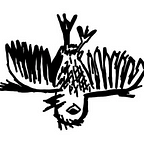A Tribute to Digging
“…But I’ve no spade to follow men like them. Between my finger and my thumb, the squat pen rests. I’ll dig, with it.”
— Seamus Heaney, “Digging” from Death of a Naturalist.
Digging is writing, writing is digging. Each are approached with ambition — often in tandem with false confidence — and each are only finished when your gut tells you it’s ‘good enough’.
You’re standing up straight, head hung, eyes scanning the earth below your feet. Like Heaney’s father, you grip a spade — a shovel — for potatoes. Or maybe, like I once did, you hold a large 4-pronged fork — for carrots. Either way, you’re setting out to sink that tool into the earth, pull it back out, displace soil and sustenance, again, and again, and again. When digging, it takes time to find your rhythm, but it comes. Yet as good as rhythm may be for efficiency, it’s no good if not with precision. You’ve got to harvest as many potatoes, or as many carrots, as you can; but they should be in tact, and palatable. This is akin to writing. It takes time for prose to flow, and it comes. But what good is prose without the clarity, the cohesion, to make it succinct — let alone moving?
Of all the memories I have from working on the farm that involved digging, carrot harvests are the most salient. (I’m not here to focus on “the farm” in its entirety, that would be a book and a half. But I must at least acknowledge that place’s names: First and foremost, the traditional lands of the Abenaki peoples—Ndakinna; and, more specifically, nestled between the hamlets of Cuttingsville and Shrewsbury in southern Vermont — Evening Song Farm).
Working at Evening Song imbued me with an immense appreciation for farming, specifically for organic vegetable farming. I’ve since given deep meaning to even the most mundane tasks it involved; including digging for carrots. That’s largely what organic vegetable farming was, after all: a myriad of tasks. Often digging. Always toiling. It was so much more than toiling, too, but as I sit here bursting at the seams with nostalgia, I envision a different time to reflect more fully on the farm days. Later. Right now, it’s about Digging.
Heaney’s infatuation with his father’s potato farming coupled with his compulsion to write resonates with me. As much as I love farming, as deep as I’ve found value in agricultural toiling, I’ve known that even deeper are my desires to toil with writing, like Heaney. Maybe it was this kind of want I have for writing that He once had; a want which morphed into a need. That’s what Heaney meant when he said he had no spade—the “squat pen” sat too snug between his finger and thumb to drop it for any other tool. So he continued to dig, with it. I intend to do the same with my writing. Although, I admit, my words will more often be typed with a keyboard to a screen…
Still, here I dig:
When digging for carrots, the fork’s prongs may hit a rock. (This is actually quite likely in Vermont’s particularly rocky soils). When this happens, you simply have to re-adjust. Yank the fork back out of the ground, hover it over that same ground, just a few inches back, or forward. If backward, fine, just make sure you’re still going to dig close enough to the carrots. If forward, closer to the stems, make sure you’re not aimed to break the roots. Once you have your spot, thrust the fork down there, into the earth once more. Did you hit a rock again? The same rock maybe? (It’s probably huge). Try again. Take the fork back out, hold it, without looking up, and try again. Once you’ve sunk it (good job), it’s time to pull back on the fork’s wooden shaft. Now, with the fork’s prongs sunk deep into the soil, only its shaft above the ground, use that leverage to unearth those tasty orange rods.
Leave some to the side for bunching, cleaning, and storing, but take one for yourself. I’d suggest rubbing the dirt off under the armpit of your shirt. Before you take a bite, take a gander. No carrot tastes better, I’m sure of it.
Those carrots are not unlike words of prose — there, but only seen when dug for, and best devoured after they’re truly cared for.
